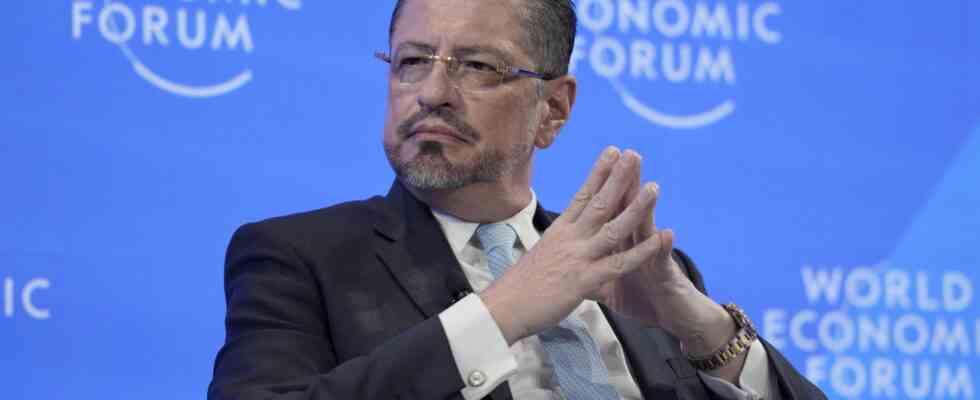Status: 01/19/2023 11:44 a.m
Government officials in Costa Rica are said to have paid trolls to praise their work and rail against critics. Apparently, President Chaves doesn’t see this as a major problem – and instead attacks the press.
The minister herself got the ball rolling. Joselyn Chacón, head of the heavyweight Ministry of Health and Social Affairs, made it public in mid-December that she was being blackmailed – by an Internet troll. This troll, known under the pseudonym “Piero Calandrelli”, then came out of cover. He told La Nación, the country’s largest daily newspaper, that he had worked for President Rodrigo Chaves’ election campaign and had received money from the minister to target critical journalists on social media.
Shortly before the turn of the year, during the main holiday season, Chacón admitted to having paid money to the troll because she had been taken in by a scammer: “I made a mistake,” she said. “I trusted someone who lied to me that his daughter died in an accident, that he was a single parent and that his three daughters were starving.”
Paid trolls and a more than embarrassing excuse: The first scandal of 2023 was perfect.
“An element that needs to be questioned”
“What makes the case special is that the current president’s entire election campaign was characterized by proven, illegal party financing,” says Daniela Muñoz, feminist, social activist and media representative. “And of course the trolls are an element that needs to be examined more closely.”
In the meantime, other trolls have come out. And paid trolls, i.e. people who spread false reports or discredit other people on behalf of companies, parties or governments, have been around in Costa Rica for some time, stresses journalist Joaquín Tapia:
Former presidential candidate Johnny Araya already had a budget for trolls to manipulate public opinion. In the last election campaign, trolls were apparently used on a massive scale.
Parliamentary Committee of Inquiry
President Chaves’ government, in office since May last year, is pursuing an aggressively populist course. The former World Bank official won the elections as a career changer and candidate for a party that was only founded in 2018 – with a huge and expensive campaign, the financing of which is now the concern of the public prosecutor and a parliamentary committee of inquiry.
But whether it’s trolls or party donations, the president stands in front of his health minister, instead attacking the press head-on and calling them “sicarios” — that’s what contract killers are called in Latin America. “There are journalists who are political ‘sicarios’ – people who attack the minister for absolutely no reason,” Chaves fumed. “Political character assassination has long been a tool of some media outlets in Costa Rica and around the world.”
“Line of Trump and other populists”
In this attack strategy, the trolls then play a key role again. Apparently as ordinary citizens, they accompany the government’s attacks and, according to Muñoz, are quite successful. “The attacks on the press follow the line of Donald Trump and other populists: to discredit those who question you,” she explains.
Journalists who research corruption cases are now seen as part of a “rogue press,” says Muñoz. “And the campaign in the social networks that the trolls are running have definitely anchored this way of thinking in parts of the population.” Even with major scandals and corruption cases, many people believed the government and not the journalists: “And that’s dangerous.”
Popularity by crowd of trolls?
So far it has been politically successful. The president achieved almost 75 percent approval rating in polls. In Costa Rica, too, the opposition, press and civil society are finding it difficult to deal with aggressive populism and trolls.
A few days ago the opposition MP Eli Feinzaig asked the troll “Piero Calandrelli”, whose real name is Alberto Jesús Vargas, what effects the trolls had on democracy in Costa Rica. “The government says President Chaves doesn’t need trolls, he’s immensely popular.” He wants to understand whether Chavez has not gained this popularity “perhaps through a horde of trolls who constantly spread the philosophy and ideas of his government among the people”.
Paid trolls that may have been a key factor in today’s President’s narrow election victory.
Government trolls in Costa Rica
Markus Plate, ARD Mexico City, January 19, 2023 12:34 a.m

